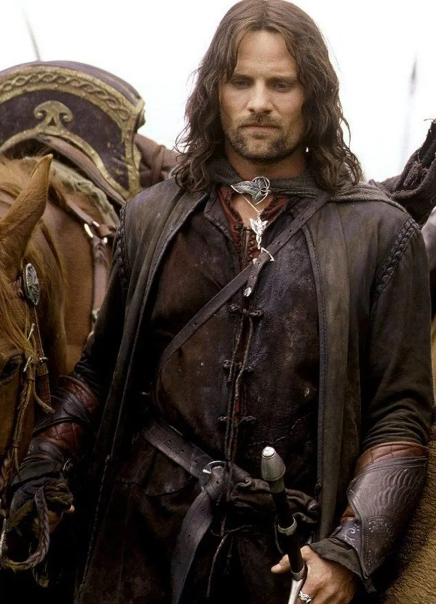
I missed the The Lord of the Rings trilogy the first time around in the theaters, in the early aughts. I was too single-mindedly involved with music and making websites at the time, and if I had the inclination to bother with diversions outside of those two, going to the movies wouldn’t be at the top of the list. Not to worry, because the trilogy was rereleased in the theaters recently: the director’s cut of each movie, one a night, for three nights in a row. You wouldn’t think it, but it takes some willpower and energy to sit for 3-4 hours straight and pay attention.
I noticed how different Aragorn’s character treatment was compared to the books. Now, I had only read The Fellowship of the Ring a few years ago, but abandoned reading the rest of the series because of you-know-what happening in early 2020. International emergencies, real or fake, can really mess with your habits in all sorts of ways. But I what I had remembered of the book and reading a few analyses online, Aragorn was much more sure of his place in the world than his film version.
There were literary reasons why Tolkien made Aragorn so aspirational, or I should say, there were reasons why the Aragorn of Peter Jackson’s version deviated from the source character. The reasons for both, are both textual and meta-textual. Tolkien’s Aragorn was a more mythical hero-figure who had a clear goal of returning Isildur’s bloodline to Gondor’s throne. His claim to the throne was strong and he had obvious motivations to follow through on that claim. He had to “simply” manipulate the events around him to clear the way to get there.
Jackson’s Aragorn battled with more internal conflicts: he was plagued with doubt because he thought he would fail in the same way Isildur did and fall in thrall with the One Ring. “The same blood runs through my veins,” or however that line went, when he was talking with Boromir at Rivendell. Naturally, given everything Gandalf was working towards, getting Aragorn back on the throne was a key, high-priority goal. Aragorn, despite following Gandalf’s lead, was wishy-washy about ascending, but an eternal entity sent from your universe’s God, in cantankerous wizard form, is a good external motivator to get one’s act together. Aragorn’s struggle in the film works for modern audiences because we like to see powerful, attractive people experience and overcome self-doubt. We see ourselves in Aragorn’s place as opposed to seeing him transcendent as an unrelatable identity, like a figure of legend. We can’t really superimpose ourselves onto Odysseus or King Arthur or Samson meaningfully. The overlap is minimal unless you’re one of those dark triad types.
Aragorn’s cinematic treatment is also a testament to Jackson’s filmmaking prowess, because internal struggles are difficult to portray properly without being privy to the character’s head-talk—paradoxically, that’s much easier to do through the written word than moving pictures. Sure, voiceovers and internal dialogue were always a thing in movies but as a vehicle to illustrate complicated psychological battles, it’s pretty limiting. You need to be a master moviemaker to get it to work properly without taking people out of the story or having it simply be corny. Gone are the days when kaleidoscoping LSD-inspired scenes in movies were fashionable, where characters had that trippy confessional booth to admit things to themselves and the audience, accompanied by gonzo visuals and shepard tones. Maybe all the drugs and who knows what that came out of MKUltra made conceiving filmmaking visuals a bit easier, but it’s still hard to pull off convincingly. It’s even harder to create a work that doesn’t become dated.
Jackson’s Aragorn I think works better for modern film, but there is one shared trait between his Aragorn and Tolkien’s. Eventually, Aragorn’s arc begins where Boromir’s ends, where the former pledges to the latter, after being stuck with orc arrows, that he will restore Gondor. Yes, it’s a personal reason—modern storyteller go to outrageous lengths to heap personal stakes onto protagonists and shove into that second act—but it becomes Aragorn’s duty to restore Gondor. “This time, it’s personal” isn’t just a revenge fantasy cliché, it’s a required plot point you’ll find in every story in the individualist occident. Similarly, Tolkien’s Aragorn knows it’s his duty to ascend to the throne, but he had already realized that before the book began. His personal desires weren’t the motivation.
* I appreciate you comparing me to Aragorn, and although I have some positive qualities, I am nothing like him.
2 Comments
In the book he was an obvious Christ figure. It’s nearly impossible to fit the themes of the book into a movie.
I don’t remember much of the book except a few parts. I’ll keep that in mind when I reread it.